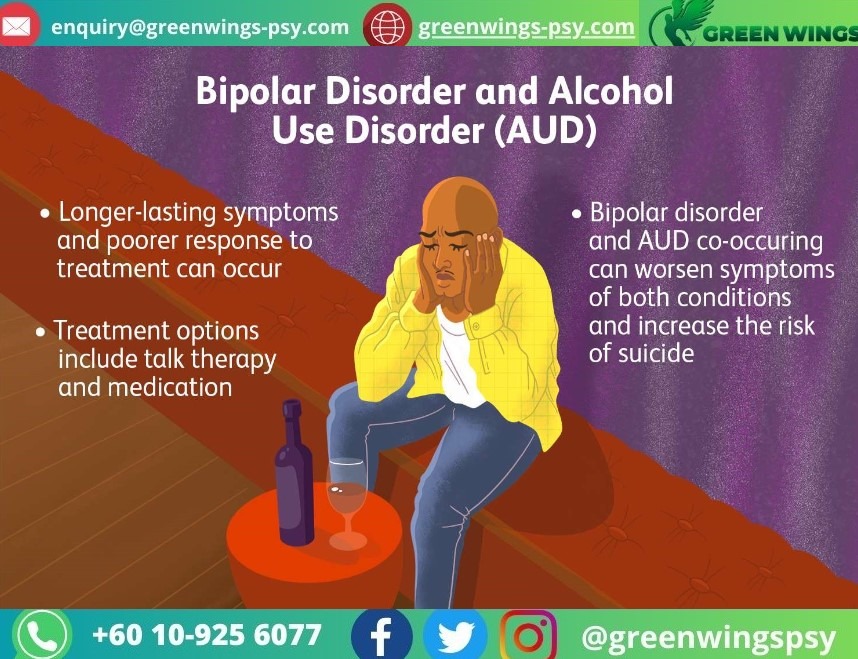Introduction:
In the intricate tapestry of mental health, the relationship between alcohol addiction and bipolar disorder emerges as a perplexing and challenging phenomenon. Both conditions carry significant individual burdens, but when they coexist, the complexities multiply. Understanding the intricate interplay between alcohol addiction and bipolar disorder is crucial for effective diagnosis, treatment, and support. This blog delves into the nuances of this intricate relationship, exploring the connections, challenges, and potential avenues for comprehensive care.
The Overlapping Patterns:
Bipolar disorder, characterized by extreme mood swings ranging from depressive lows to manic highs, often coexists with substance abuse disorders, particularly alcohol addiction. The link between the two is not purely coincidental; research suggests a bidirectional relationship where one can exacerbate the other. Individuals with bipolar disorder may turn to alcohol as a form of self-medication, attempting to alleviate the intense emotional states that accompany their condition. Conversely, excessive alcohol consumption can trigger and intensify the episodes of mania or depression in those with bipolar disorder.
Self-Medication and Escapism:
Individuals grappling with bipolar disorder often find themselves on an emotional roller coaster, where the highs are euphoric and the lows are debilitating. The desire for stability and relief from these extremes can drive individuals toward substances like alcohol. The sedative effects of alcohol may temporarily soothe the intense emotions associated with bipolar disorder, creating a self-medicating cycle that, unfortunately, perpetuates the dual struggle of addiction and mental illness.
Impact on Treatment:
The coexistence of alcohol addiction and bipolar disorder presents a formidable challenge in the realm of mental health treatment. Substance abuse can interfere with the effectiveness of mood-stabilizing medications commonly prescribed for bipolar disorder. Additionally, the unpredictable nature of alcohol’s impact on mood complicates the management of bipolar symptoms, making it challenging for healthcare professionals to tailor treatment plans.
Dual Diagnosis Dilemma:
Identifying and treating co-occurring disorders require a comprehensive approach known as dual diagnosis treatment. This involves addressing both the bipolar disorder and alcohol addiction simultaneously. The challenge lies in determining which condition surfaced first, as this can influence the course of treatment. The integrated approach typically involves a combination of pharmacotherapy, psychotherapy, and support groups tailored to address both mental health and substance abuse components.
Genetic Predisposition:
The intricate relationship between alcohol addiction and bipolar disorder may also have genetic underpinnings. Studies have suggested that certain genetic factors may contribute to an increased vulnerability to both conditions. Understanding these genetic links could pave the way for more targeted and personalized treatment approaches, potentially reducing the risk of relapse.
Breaking the Cycle:
Breaking the cycle of alcohol addiction and bipolar disorder necessitates a multi-faceted approach that acknowledges the interconnected nature of these conditions. Psychoeducation plays a pivotal role, helping individuals recognize the triggers and patterns that contribute to both their alcohol use and mood fluctuations. Cognitive-behavioral therapy (CBT) can be particularly beneficial in building coping mechanisms and breaking destructive behavioral cycles.
Building a Supportive Network:
A robust support network is crucial for individuals navigating the complex terrain of bipolar disorder and alcohol addiction. Loved ones, friends, and support groups can provide the emotional scaffolding needed for individuals to stay committed to their recovery journey. Open communication, empathy, and a non-judgmental stance are vital components in fostering a supportive environment.
Conclusion:
The relationship between alcohol addiction and bipolar disorder highlights the need for a nuanced and integrated approach to mental health care. Breaking the cycle requires a thorough understanding of the interplay between these conditions, coupled with targeted interventions that address both the biological and psychosocial aspects. As we continue to unravel the complexities of this relationship, a compassionate and comprehensive approach will be key to helping individuals find stability and reclaim their lives from the clutches of this challenging dual diagnosis. We at Green Wings Recovery Centre are determined to provide one of the best and more effective treatment for bipolar disorder along with all kinds of major addiction treatment such as drug addiction, alcohol addiction, gambling addiction etc under one roof through our most effective addiction and mental health treatment programs under the supervision of most experienced addiction specialist and mental health professionals. To know more about our treatment structure and fees; do feel free to reach us via Call/Whatsapp +60 10-925 6077 or visit our website https://greenwings-psy.com/.

